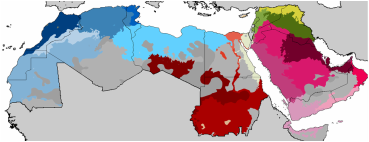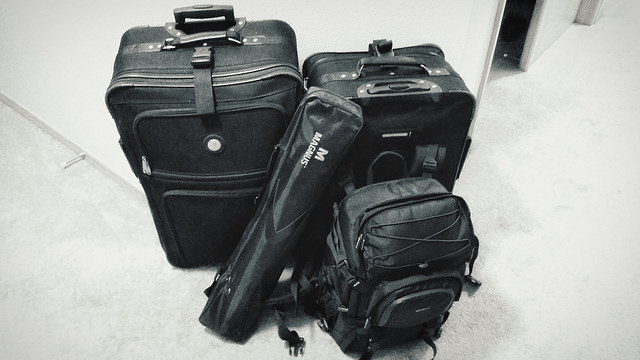Photo by Cassandra Broadwin
Language
 Arabic dialects showing their comparability to each other.
Arabic dialects showing their comparability to each other.
Moroccan Arabic (Darija) is the primary language spoken throughout Morocco and is certainly the most widely known except in the most remote mountain regions and by older Amazigh people. Although Darija can be used to travel and do work in most of the country, some Amazigh people may use it grudgingly, particularly in the South and the mountains, meaning that learning the local Amazigh languages of Tamazight (Tama-zeet), Tashelheet, and Tarafit will make work more productive. Indeed, it might be essential for some PCVs to learn. All things considered, PC Morocco focuses on teaching Darija first. Those PCVs who need to learn one of the Amazigh languages will have the chance to do so, partially during CBT, partially during "In Service Training" (IST), and partially at an intensive workshop that is held every year.
Darija is technically not a written language and is not fully mutually intelligible with Modern Standard Arabic (Fus7a, or Fu-sah), but it uses many of the words either directly or slightly altered. Although Moroccans send text and chat messages using a transliteration into the Latin alphabet combined with a few numbers, most things in country are written using the Arabic alphabet, making Arabic script a worthwhile thing to learn. It is perhaps the most important thing you can do language-wise to prepare for your service: Many volunteers have noted that the people who knew the Arabic alphabet before their service (written and spoken) acquired Darija the fastest, which will make your service easier and more productive. That said, you will be taught the script during training.
French is also used extensively by formally-educated Moroccans, particularly in places like Rabat and Casablanca. Most official government work is done in French, a fact that can sometimes cause great confusion for volunteers when a meeting suddenly switches to French. Knowing French can be helpful (especially numbers!) because many Moroccans assume all foreigners are French, but isn't absolutely necessary if you can explain that you don't know French.
Darija is technically not a written language and is not fully mutually intelligible with Modern Standard Arabic (Fus7a, or Fu-sah), but it uses many of the words either directly or slightly altered. Although Moroccans send text and chat messages using a transliteration into the Latin alphabet combined with a few numbers, most things in country are written using the Arabic alphabet, making Arabic script a worthwhile thing to learn. It is perhaps the most important thing you can do language-wise to prepare for your service: Many volunteers have noted that the people who knew the Arabic alphabet before their service (written and spoken) acquired Darija the fastest, which will make your service easier and more productive. That said, you will be taught the script during training.
French is also used extensively by formally-educated Moroccans, particularly in places like Rabat and Casablanca. Most official government work is done in French, a fact that can sometimes cause great confusion for volunteers when a meeting suddenly switches to French. Knowing French can be helpful (especially numbers!) because many Moroccans assume all foreigners are French, but isn't absolutely necessary if you can explain that you don't know French.
Language note! You will see "7" used as a letter throughout this entire website. Because of the transliteration from Arabic to Latin script, some people (Moroccans and PCVs alike) will usually use the number 7 or a capital H to indicate the Arabic letter ح. This makes the sound of a whispered English "h".
Finally, Fus7a is understood by most, if not all, Moroccans. It will generally never be heard on the street, but it's used in classrooms, mosques, and on television. Moreover, most documents are written in Fus7a, meaning that even PCVs who learn to read and write Darija will have difficulty understanding them. Aside from TV, PCVs do encounter Fus7a when they organize formal lessons of some sort with a Moroccan counterpart because it is a richer language, containing more precise words for technical and emotional topics of conversation. As a result, volunteers might find themselves temporarily lost in such environments. However, a simple request to keep the conversation in Darija (or French if you know it) will help them switch back.
Once you reach your final site, Peace Corps will reimburse you for language tutoring. You can be reimbursed for Darija, Tamazight, Tashelheet, and Fus7a. If you want to be tutored in French, you will have to pay for it yourself.
Once you reach your final site, Peace Corps will reimburse you for language tutoring. You can be reimbursed for Darija, Tamazight, Tashelheet, and Fus7a. If you want to be tutored in French, you will have to pay for it yourself.
Interesting information about Morocco
If Morocco were your home instead of The United States, you would...
If Morocco were your home instead of The United States, you would...
Shopping & PackingShopping and packing for service can be an arduous task, but with available resources like packing lists, you will get a better sense of what to bring!
Ultimate PC Morocco Packing List Peace Corps Packing List, Discounts & Advice Official Peace Corps Morocco Packing List POC Packing Guide for Morocco Discounts from Retailers Several packing-related questions were also answered by PCVs in the Frequently Asked Questions blog post.
|
Welcome to Morocco
|
Movies Featuring Morocco / Culture
Hikayat Morocco - There is a documentary here about traditional Moroccan storytelling Le Grand Voyage - Beautiful film in Darija Movies Set in Morocco Movies Filmed in Morocco Best Movies for Moroccan Scenery |
Books Featuring Morocco / Culture
Religion in general - and Islam specifically - are common topics of discussion and are, naturally, important in understanding Moroccan culture. Destiny Disrupted by Tamim Ansary In Morocco by Edith Wharton Culture Shock! Morocco by Orin Hargraves The Crisis of Islam by Bernard Lewis The Alchemist by Paulo Coelho The Conquest of Morocco by Douglas Porch |
Popular Music
Zina by Babylone Taragalte by Oum (popular artist in the south) Disk Hyati by Maria Nadim Morocco's National Anthem Sugar and Flies by PCV Blake |
